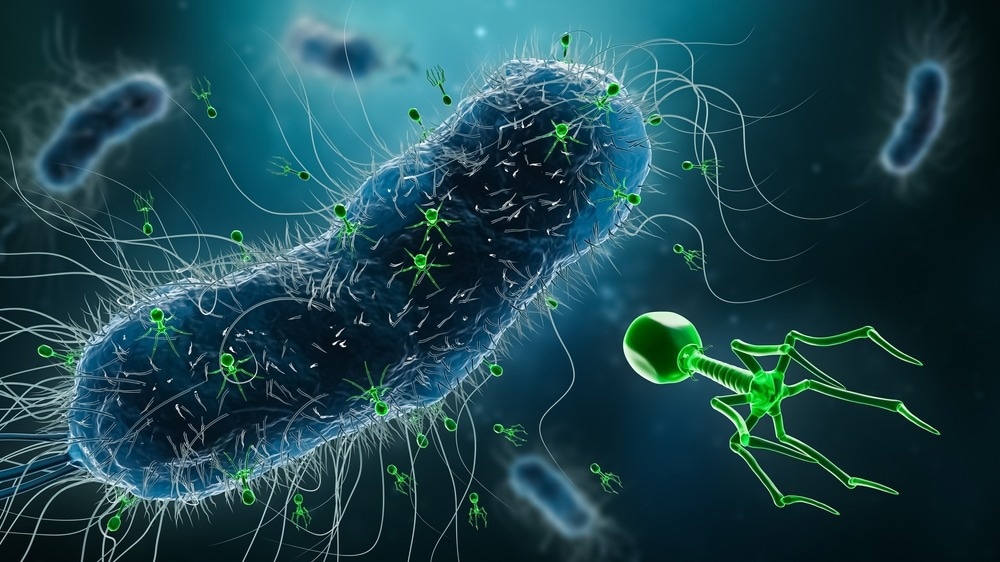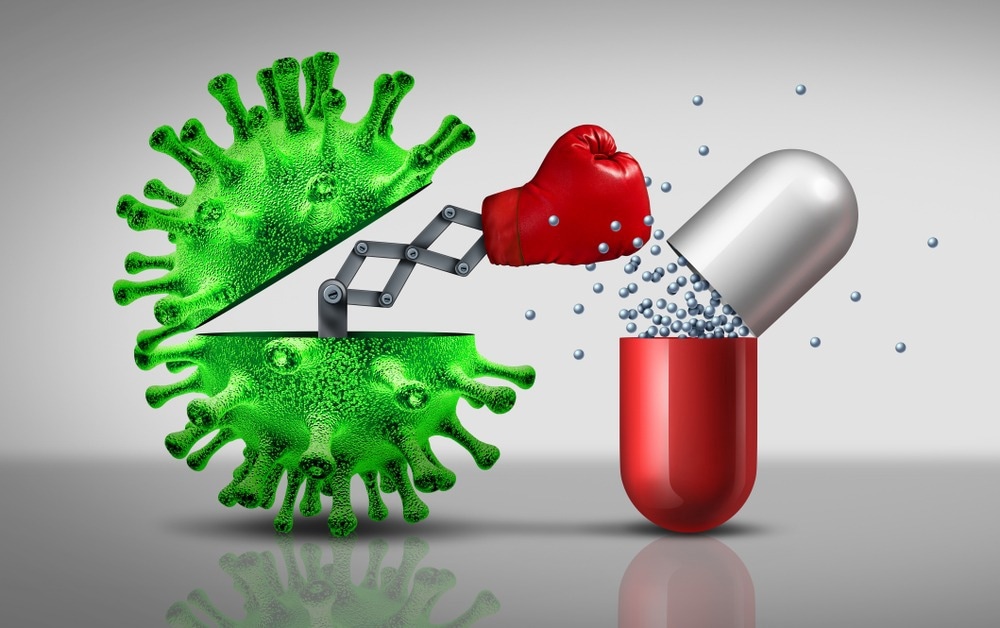Introduction
How is phage therapy used in the clinic?
Pros and cons of phage therapy
References
A phage is a virus specific to bacteria in that the mechanism of phage self-replication relies on hijacking the cellular machinery of a bacterium and are thus unable to survive in other hosts. Phage therapy, or bacteriophage therapy, uses phages in a clinical setting to combat bacterial infections. Phages propagate like other viruses, first injecting their genetic material (DNA or RNA) into the cell, where transcription and translation proteins produce the viral components, which assemble into a new viral particle within the cell. Eventually, the cell membrane is eroded, releasing the particles into the surroundings to infect neighboring cells. Like human viruses, phages require potential hosts to carry the complimentary receptor, and the degree of host specificity varies greatly between strains.
Given the efficacy and specificity of phages against bacteria, they have been investigated for use as antibiotics since the early 20th century, with cocktails of naturally occurring phages being used to combat dysentery as early as 1991, nine years before the discovery of penicillin. The nature of phages was still a matter of debate until their imaging by electron microscopy in the 1940s, and since have been realized as the most abundant biological entity on Earth, responsible for a large proportion of global bacteria death.

Image Credit: MattLphotography/Shutterstock.com
How is phage therapy used in the clinic?
The clinical use of phage therapy has historically been employed more greatly in eastern Europe and Russia in particular, though it has regained popularity in the west since the 1980s with the growing concern of conventional antibiotic resistance. Biotechnological advances have allowed the generation of engineered phages to be altered to improve specificity or lethality towards a specific bacterial strain, as well as the purification of toxic phage proteins for direct use as an antibacterial agent.
No phage therapy treatment is currently approved for clinical use in the USA, though the Food and Drug Administration (FDA) has approved three clinical trials to evaluate different uses of bacteriophage therapy. The first trials began on 9th December 2020 and investigated the efficacy and safety of bacteriophage therapy for patients with urinary tract infections of E. coli and K. pneumoniae. The second is a phase 2 study that started on 29th March 2021 to investigate the general safety of phage therapy in cystic fibrosis patients and the reduction in sputum bacterial load in Pseudomonas aeruginosa infection.
The third study will begin in October 2022 and will study the use of phage therapy in patients with chronic prosthetic hip or knee joint infections with up to two of the following strains: Staphylococcus aureus, Staphylococcus epidermidis, Staphylococcus lugdunensis, Streptococcus sp., Enterococcus faecium, Enterococcus faecalis, Escherichia coli, Pseudomonas aeruginosa, and/or Klebsiella pneumoniae.
Several commercially available phage treatments are approved by the FDA and regularly employed in the food industry, largely in the dairy and meat industry, to combat bacterial growth. Phages can also be used for purposes other than the direct destruction of target bacteria since the proteins they utilize cellular machinery to produce can be altered by genetic engineering methods. For example, Schofield et al. (2013) generated bioluminescent phages with extreme specificity towards B. anthracis (anthrax), allowing quick identification.
Bioengineered phages that target bacteria carrying antibiotic-resistance genes are an active field of research in the fight against global antibiotic resistance, and besides use in patients, such treatments could be applied to hospital surfaces and other high-risk areas as phages can persist on surfaces for long periods.

Image Credit: Lightspring/Shutterstock.com
Pros and cons of phage therapy
Phage therapy has several potential advantages over conventional antibiotic treatment, avoiding many of the side effects commonly associated with strong or long-term antibiotic use, which can be detrimental to the heart, liver, kidneys, brain, and gastrointestinal system, in addition to causing immune complications via the eradication of non-harmful bacterial populations. However, despite the lack of interaction between mammalian cells and phages, patients undergoing phage therapy frequently exhibit evidence of immune response, with changes in cytokine levels and immune complexes observed. In some cases, this may be advantageous, promoting the individual's immune response, though this may be strongly case-dependent.
Further, while the specificity of phages towards specific bacterial strains and even sub-species is of great advantage in many applications, it may require a more thorough prior identification of strains involved in infection and make the treatment of multi-strain infections more difficult. The great specificity of phage therapeutics has also been demonstrated to render them ineffective amongst different populations. For example, a study by Sarker et al. (2016) applied a commonly used E. coli phage cocktail to Bangladeshi children, finding no benefit beyond placebo due to the differing characteristics of local E. coli strains.
References:
- Lin, D. M. et al. (2017) Phage therapy: An alternative to antibiotics in the age of multi-drug resistance. World J Gastrointest Pharmacol Ther., 8(3).
https://www.ncbi.nlm.nih.gov/pmc/articles/PMC5547374/
- Schofield, D. A., et al. (2013) Bacillus anthracis diagnostic detection and rapid antibiotic susceptibility determination using 'bioluminescent' reporter phage. Journal of Microbiological Methods, 95(2).
https://www.sciencedirect.com/science/article/pii/S0167701213002765?via%3Dihub
- Endersen, L., et al. (2014) Phage therapy in the food industry. Annu. Rev. Food Sci. Technol., 5.
https://pubmed.ncbi.nlm.nih.gov/24422588/
- Sarker, S. A., et al. (2016) Oral Phage Therapy of Acute Bacterial Diarrhea With Two Coliphage Preparations: A Randomized Trial in Children From Bangladesh. EBioMedicine, 5.
https://pubmed.ncbi.nlm.nih.gov/26981577/
Further Reading
Last Updated: Feb 1, 2023